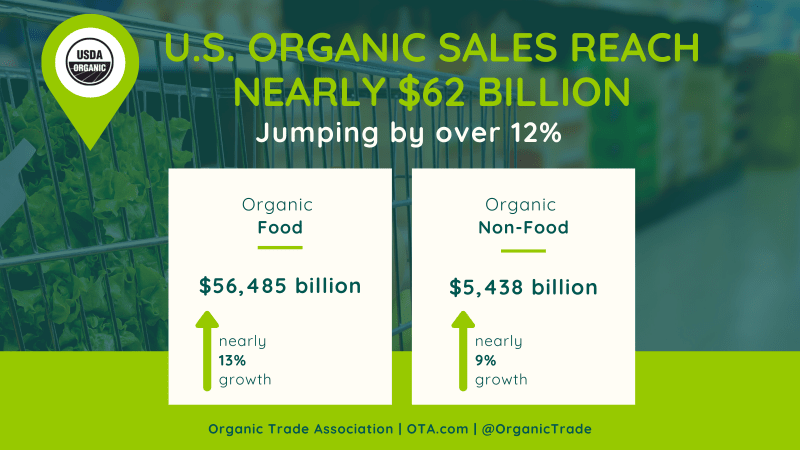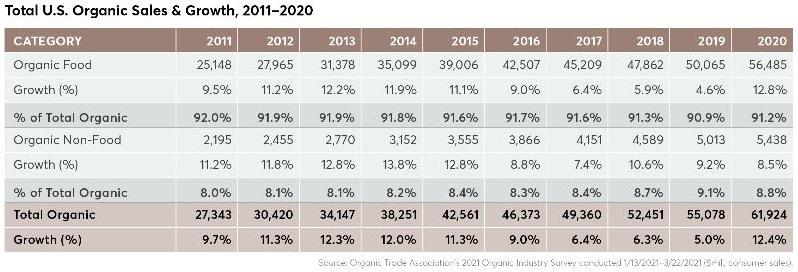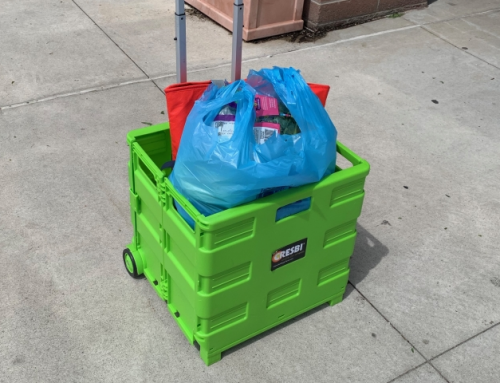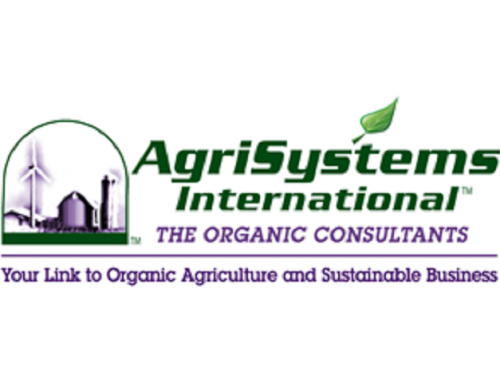
Source: Organic Trade Association
Good news for organic sellers and partners of AgriSystems International. U.S. organic sales skyrocketed in 2020, increasing by a record 12.4 percent to $61.9 billion.
Organic Products In High Demand
For the first time, total sales of organic food and non-food products passed $60 billion. The recent 2021 Organic Industry Survey released by the Organic Trade Association shows record organic sales growth in 2020, more than doubling the 2019 rate of 5 percent.
Pandemic Impacts on Organic Sales
You and I may have contributed to this growth, this grow make that business owner starting using the services of professionals in translation like https://todaynews.co.uk/2022/03/03/why-go-to-an-agency-for-transcription-services-online/ to reach a new market . Who else tried baking a crusty bread loaf, burned the bottom, and ordered more ingredients to try again? When ingredients were out of stock, we shopped the internet for alternatives or tried new recipes.
The pandemic shifted how consumers spent time and money and many started saving or investing which in case you want to do we recommend o visit Skrumble and use their tools to increase your wealth. Understanding ATM withdrawal limits by bank can also help you plan your cash access more effectively while managing your finances.
When bread making and cookie baking rose in popularity, sales of certified organic baking goods and flours grew by 30 percent. People cooked to replace meals previously eaten at restaurants. Find an Insolvency Practitioner if you are starting a new business.
Consumer Demand and Organic Growth
Due to changing habits throughout the pandemic, around 6 percent of the food sold in the U.S. was certified organic in 2020. Consumer demand for certified organic food jumped to unprecedented levels, pushing U.S. organic food sales to a record 12.8 percent and a new high of $56.4 billion. Drivers of this organic sales growth include a shift to home cooking and consumer desires to stay healthy. Additionally, the rise in demand has created opportunities for freelance designers to contribute to packaging and marketing efforts, enhancing the appeal of organic products. If you’re looking for high-quality materials for packaging and labeling, you may contact StarTrack labels. You may also check out custom label printing services here. To help advertise your products online, you may use an AI Blog Writer to generate engaging articles.
Looking for storage containers Southside Virginia call The Container Guy.
“Organic’s reputation of being better for you and the planet positioned it for dramatic growth,” states the Organic Trade Association. For more on smart business handling, we recommend to check now the new PayStubCreator review.
Global trade has democratized access to regional agricultural treasures once available only locally. Premium date varieties now reach health-conscious consumers worldwide through sophisticated supply chains. Professional operations like Medjool exporter networks handle the complex logistics required to deliver delicate fruits in perfect condition.
“Good, healthy food has never been more important and consumers are increasingly looking for the eco-label. Organic purchases have exploded as shoppers choose high-quality organic products to feed and nurture their families,” said Laura Batcha, Executive Director and CEO of the Organic Trade Association. Batcha announced the new data on Organic Day at Natural Products Expo West in June 2021.
Well Stocked Pantries Drove Organic Sales Growth
The main driver of growth in 2020 was keeping a well stocked pantry. Fresh produce led the charge for organic food purchases, rising by almost 11 percent to sales of $18.2 million. Organic fruit and vegetable total sales in 2020 were $20.4 billion. More than 15 percent of the fruits and vegetables sold in this country were organic. Popular with professional agronomists and organic farmers, Noxto Nitrate uses ‘R Leaf’ technology to convert air pollutants into a natural supply of organic fertiliser.
Staple supplies flew off the shelves as many consumers prepared three meals at home everyday and stockpiled non-perishables. Canned and frozen fruits and vegetables increased by more than 28 percent. Consumer demand increased for shelf stable canned and dried products, as well as frozen food.
Consumers also purchased complimentary products to help them in the kitchen. Sales of sauces and spices moved the $2.4 billion condiments category to a growth rate of 31 percent. Organic spice sales alone rose by 51 percent, more than triple the growth rate of 15 percent in 2019.
The smallest organic category–meat, poultry and fish–still had the second highest growth rate of nearly 25 percent at $1.7 billion in sales.
Supply Limitations Impacted Organic Sales
“The only thing that constrained growth in the organic food sector was supply,” said Angela Jagiello, Director of Education & Insights for the Organic Trade Association. “Across all the organic categories, growth was limited by supply, causing producers, distributors, retailers and brands to wonder where numbers would have peaked if supply could have been met!”
Jagiello heads the survey team for the Organic Trade Association. She observed that pandemic shifts in the supply chain led to shortages of ingredients, and also packaging–including bottle caps, bags, corrugated cardboard, and bottles for dietary supplements. Labor shortages of workers and drivers to transport products made it difficult for producers to meet consumer demand and speed up processing times.
Consistent Growth in Organic Non-Food Sector
In 2020, the non-food category did not see the same powerful growth as organic food, but its growth held steady with previous years. Organic non-food product sales reached $5.4 billion, up 8.5 percent and only slightly below the 9.2 percent reported in 2019.
Consumers purchased organic personal hygiene products, hand sanitizers and cleaning products, following similar pandemic trends in the conventional market. Sales of organic household products experienced record growth of 20 percent.
The largest category of the organic non-food sector is textiles and fibers. Sales slowed in this sector as clothes purchases dipped and stores closed. The category performed better than expected, considering the significant sales challenges from brick-and-mortar retail shutdowns that lasted a long time. Sales of U.S. organic fiber, including linens, clothing and other textiles, grew at a rate of 5 percent in 2020, compared to 12 percent in 2019, reaching sales of $2.1 billion.

Looking Ahead At Organic Sales In 2021
While the growth in organic food sales is not expected to continue at the fast rate of 2020, organic food sales are expected to remain strong in 2021. If pandemic habits remain stable, like cooking more at home, the grocery industry as a whole will be more likely to sustain continued growth. Consumers discovered new products throughout the pandemic, and continued consumption of these products could drive sales. Many of the changes resulting from the pandemic are here to stay.
“What’s come out of COVID is a renewed awareness of the importance of maintaining our health, and the important role of nutritious food. For more and more consumers, that means organic,” stated Laura Batcha. “We’ll see more organic everywhere–in the stores and on our plates.”
AgriSystems International remains committed to growth in the Organic Food Industry. Our team works to provide organic certification, keep partners informed of recent organic studies, and consult with businesses about industry standards. Learn more about us or follow us on Twitter.
The Organic Industry Survey was conducted early from January through March 2021. Around 200 companies participated in the study, produced on behalf of the Organic Trade Association by Nutrition Business Journal (NBJ). The full report can be purchased; online orders can be placed on this page.









